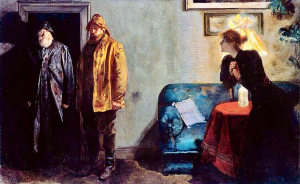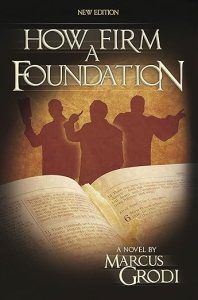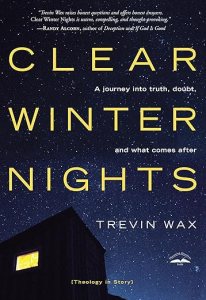We support our Publishers and Content Creators. You can view this story on their website by CLICKING HERE.
Christian realist fiction refrains from the depiction of anything fantastic, magical, miraculous, or overtly supernatural, instead showing the struggle between good and evil which rages in each individual human heart. Here are four such novels that may not be classics, but which are worth reading and perhaps revisiting.
 In an effort to serve as a catalyst for a new Christian literary revival, I am continuing the series entitled “Notes from Underground” focusing on exciting contemporary literature written from an authentically orthodox Christian perspective. The fact is that there are many good contemporary writers who need to be better known and, more to the point, who need to be read. I would add, however, that their works are not necessarily classics, nor are they all especially great literarily. A living literary culture will include good, bad and middling works, with classics being rare. This has been true of all generations and is as true today as it has ever been. My criterion for selecting the works included in these “Notes from Underground” is simple and straightforward. I have read them and enjoyed them.
In an effort to serve as a catalyst for a new Christian literary revival, I am continuing the series entitled “Notes from Underground” focusing on exciting contemporary literature written from an authentically orthodox Christian perspective. The fact is that there are many good contemporary writers who need to be better known and, more to the point, who need to be read. I would add, however, that their works are not necessarily classics, nor are they all especially great literarily. A living literary culture will include good, bad and middling works, with classics being rare. This has been true of all generations and is as true today as it has ever been. My criterion for selecting the works included in these “Notes from Underground” is simple and straightforward. I have read them and enjoyed them.
I began with “notes” on recently published murder mysteries and continued with what I called works of Christian realism. I’d like to focus this time on some more works of Christian realism.
Defining our terms, Christian realist fiction refrains from the depiction of anything fantastic, magical, miraculous or overtly supernatural, subsuming the spiritual or supernatural within the narrative of everyday life. It shows the struggle between good and evil which rages in each individual human heart and the way that this war spills over into the individual’s relationship with others. A perfect example of Christian realist fiction is Evelyn Waugh’s Brideshead Revisited.
 How Firm a Foundation is a novel by Marcus Grodi, who is better known as the founder of the Coming Home Network and as the presenter for many years of The Journey Home on EWTN. His novel tells the story of the protagonist’s journey home to the Catholic Church and is peppered with texts from Scripture which illuminate the journey. Many might be irritated by the “preachiness” that this implies and it is true that preachiness usually signals the death of any literary work. Literature should show in order to teach, if indeed it proposes to teach anything at all; it should never preach in order to teach. In this case, however, the engagement and grappling with Scripture is at the heart of the narrative. A parallel might be Loss and Gain, John Henry Newman’s quasi-autobiographical novel, which charts the protagonist’s struggle with theological ideas as he progresses toward religious conversion. If we see and read the work as the novelization of spiritual struggle, it can be enjoyed as literature and not merely as apologetics. If the novelist is telling a good story and not merely discussing ideas, his work can survive a degree of preachiness without committing literary suicide. How Firm a Foundation succeeds in this respect. It is a good story, including edge-of-the-seat moments, such as the protagonist’s close encounter with danger and the prospect of violence at an isolated rest stop.
How Firm a Foundation is a novel by Marcus Grodi, who is better known as the founder of the Coming Home Network and as the presenter for many years of The Journey Home on EWTN. His novel tells the story of the protagonist’s journey home to the Catholic Church and is peppered with texts from Scripture which illuminate the journey. Many might be irritated by the “preachiness” that this implies and it is true that preachiness usually signals the death of any literary work. Literature should show in order to teach, if indeed it proposes to teach anything at all; it should never preach in order to teach. In this case, however, the engagement and grappling with Scripture is at the heart of the narrative. A parallel might be Loss and Gain, John Henry Newman’s quasi-autobiographical novel, which charts the protagonist’s struggle with theological ideas as he progresses toward religious conversion. If we see and read the work as the novelization of spiritual struggle, it can be enjoyed as literature and not merely as apologetics. If the novelist is telling a good story and not merely discussing ideas, his work can survive a degree of preachiness without committing literary suicide. How Firm a Foundation succeeds in this respect. It is a good story, including edge-of-the-seat moments, such as the protagonist’s close encounter with danger and the prospect of violence at an isolated rest stop.
 Clear Winter Nights by Trevin Wax might be seen as the Protestant equivalent of How Firm a Foundation. It tells of a young man’s struggle with faith and disillusionment. As the subtitle proclaims, it is “a journey into truth, doubt, and what comes after”. Trevin Wax is an intellectually rigorous and theologically vigorous Evangelical who is inspired by, and inspires with, the “mere Christianity” of C. S. Lewis and the “orthodoxy” of G. K. Chesterton. Clear Winter Nights is filled with a lively engagement with the intersection of faith and reason which was the hallmark of Lewis and Chesterton. Theological quibbles aside, Mr. Wax’s novel is full of the robust Christianity which does not want to move with the world because it wants to move the world.
Clear Winter Nights by Trevin Wax might be seen as the Protestant equivalent of How Firm a Foundation. It tells of a young man’s struggle with faith and disillusionment. As the subtitle proclaims, it is “a journey into truth, doubt, and what comes after”. Trevin Wax is an intellectually rigorous and theologically vigorous Evangelical who is inspired by, and inspires with, the “mere Christianity” of C. S. Lewis and the “orthodoxy” of G. K. Chesterton. Clear Winter Nights is filled with a lively engagement with the intersection of faith and reason which was the hallmark of Lewis and Chesterton. Theological quibbles aside, Mr. Wax’s novel is full of the robust Christianity which does not want to move with the world because it wants to move the world.
 Brendan Hodge’s debut novel, If You Can Get It, which I’ve just finished reading, is a true delight. The title refers to the song, Nice Work If You Can Get It by George and Ira Gershwin, made famous by Fred Astaire and recorded by Frank Sinatra among others. What qualifies as “nice work” is one of the novel’s themes. The principal character, Jen Nilsson, has made a “success” of her young life in terms of her high-flying corporate career and the high-flying salary that goes with it. Her younger sister, Katie, on the other hand, seems to be a miserable loser in worldly terms. Just out of college and with no clear idea of what to do with her life or herself, she moves in with her sister and takes a job at Starbucks. Both sisters are estranged from their Catholic parents, preferring the comfort of a churchless secular lifestyle. As the story unfolds, we see the dark and sordid underbelly of corporate globalism, which rides roughshod over the dignity of the human person. If this is “nice work”, who would want it? Jen and Katie come to understand that true fulfillment and true love are to be found in a small town and in local communities, not in silicon valley’s false and foolish gospel of self-empowerment.
Brendan Hodge’s debut novel, If You Can Get It, which I’ve just finished reading, is a true delight. The title refers to the song, Nice Work If You Can Get It by George and Ira Gershwin, made famous by Fred Astaire and recorded by Frank Sinatra among others. What qualifies as “nice work” is one of the novel’s themes. The principal character, Jen Nilsson, has made a “success” of her young life in terms of her high-flying corporate career and the high-flying salary that goes with it. Her younger sister, Katie, on the other hand, seems to be a miserable loser in worldly terms. Just out of college and with no clear idea of what to do with her life or herself, she moves in with her sister and takes a job at Starbucks. Both sisters are estranged from their Catholic parents, preferring the comfort of a churchless secular lifestyle. As the story unfolds, we see the dark and sordid underbelly of corporate globalism, which rides roughshod over the dignity of the human person. If this is “nice work”, who would want it? Jen and Katie come to understand that true fulfillment and true love are to be found in a small town and in local communities, not in silicon valley’s false and foolish gospel of self-empowerment.
Each of these novels holds up a mirror to reality and a mirror to the reader. Each of them looks the reader in the eye and shows him the reality about himself and the world in which he finds himself. This is what good fiction should do and is called to do. These novels might not be classics of the literary calibre of Brideshead Revisited, but they are worth reading, and some will even be worth revisiting.
The Imaginative Conservative applies the principle of appreciation to the discussion of culture and politics—we approach dialogue with magnanimity rather than with mere civility. Will you help us remain a refreshing oasis in the increasingly contentious arena of modern discourse? Please consider donating now.
The featured image is “Eye-Witnesses” (1895) by Christian Krohg, and is in the public domain, courtesy of Wikimedia Commons.
Share This Story, Choose Your Platform!
Go to Top

 Conservative
Conservative  Search
Search Trending
Trending Current News
Current News 





